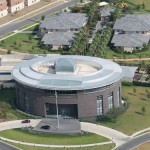Bob Hejl – W2IK World Trade Center Disaster First Responder
PTSD can happen at any time after an event. As in my case, even years after. There is usually a “trigger” (a word, smell, image, another experience, etc) which can set it off, and in my case it was just a thought that popped into my head.
Allow me to explain.
 I currently work at a place called “The Center For The Intrepid” or CFI which is a special rehabilitation complex on an Army medical base in San Antonio. At CFI, they have all the “Wounded Warriors” (Army, Navy, Air Force and Marines) who’ve lost limbs during the Mid East conflict. This building is the first of it’s kind. They develop special prosthetics and also help through physical therapy until most soldiers can walk just as good as you or I.
I currently work at a place called “The Center For The Intrepid” or CFI which is a special rehabilitation complex on an Army medical base in San Antonio. At CFI, they have all the “Wounded Warriors” (Army, Navy, Air Force and Marines) who’ve lost limbs during the Mid East conflict. This building is the first of it’s kind. They develop special prosthetics and also help through physical therapy until most soldiers can walk just as good as you or I.
It’s amazing how the latest technology can help these amputees. Each prosthetic device can cost anywhere from 12 to 100 thousand dollars. I, for one, am glad the government is taking such good care of these heroes.
One day, last month, while noticing quite a number of them in the lounge, I started thinking: “If the World Trade Center Disaster didn’t occur, probably all of these brave men and women would still have their missing limbs.”
Whether correct or false, this set off my “trigger” and began my first bout with PTSD, even though I had no earlier typical symptoms such as dreams or nightmares of the event. I began having breathing problems, but only at night. I could not sleep because it felt as if I was having an asthma attack even though I don’t have an asthmatic condition. It felt like I was suffocating.
My house was thoroughly checked for irritants such as mold, etc. Nothing was found. I even had a chest x-ray which revealed no serious problems other than many small particles that were stuck in my lungs from the WTC exposure but not enough to cause this type of breathing problem. I found out that could I easily fall asleep on a cot out on my porch, but not indoors. This was how my PTSD surfaced.
Upon consultation with experts in the field (and there are several at CSI who deal with the soldiers’ PTSDs and emotional problems) it seems that my subconscious had a fear of being trapped in a collapsed building. I am currently working through my PTSD condition through consultation and medication.
Last night, I could actually sleep indoors as long as some windows were open and I faced one. Taking an all natural sleep enhancer was also needed. Slowly, and hopefully, I can return to a normal sleep routine.
Now that I’ve discovered that I actually have PTSD, it is something I’ll have to deal with for the rest of my life. There is no such thing as a “cure” for PTSD and it could crop up as other symptoms.
In passing this information along, I am hoping that other Emcomm workers who might have been or will be exposed to sad events such as a plane disaster, etc. will take heed. Think about how any emergency event might affect you. PTSD can sneak up on you, as it did for me. Know that it might be a possibility and read more about PTSD.
Emcomm is a very important part of assisting in a disaster. We need to keep responding as the professionals we all are. Just be aware that ALL rescue workers can be at risk from developing PTSD whether you handle an axe, a tourniquet or even a microphone.
